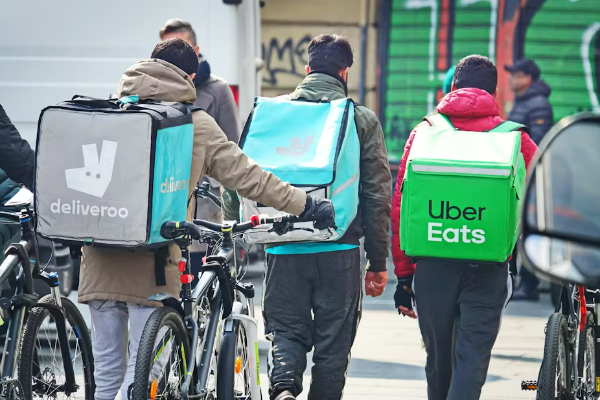What is a gig economy?
A gig economy refers to a labor market where the workers are freelance or work part-time rather than having a permanent or full-time job. Millions of people all over the world don’t have the privilege or opportunity to work a 9–5, and that’s where the gig economy comes in. Apps such as Lyft, Uber Eats, and Airbnb are all examples of the gig economy. Essentially, it’s labor done for money through digital platforms.
Despite not having the typical benefits of a normal job, this type of work is far more convenient, as people can choose where and how many hours they work. People who need temporary money, such as college students or laid-off workers, can make supplemental income until they find a more permanent job. This makes unemployment less likely and provides safety and peace of mind for anyone struggling, without having to rely on emergency funds or other people.
How it all started
In the global financial crisis of 2008, freelance work became a necessity to survive. With unemployment at an all-time high, people looked toward the gig economy to make money. However, it wasn’t until the COVID pandemic that it really started to take off. Working physically in buildings was limited, so remote or online work naturally rose to prominence. With much more technological advancement than in 2007–2008, people were able to work just as well remotely as they could in person. It took off with the rise of digital platforms in food and transportation, as well as the demand for more flexible schedules—helping create jobs and drive consumer spending during the pandemic. Since then, it’s only gotten bigger every year, with around 40% of the American workforce made up of gig economy workers.
Benefits of the gig economy
The company itself doesn’t have to pay the usual employee benefits or health care. So, employers looking to cut down costs are able to hire freelancers with little to no money-related repercussions. The employees, however, get the option of having an extremely flexible schedule, being able to take on a variety of different jobs, and even working multiple gigs at once. There’s also no tangled mess of contracts, so there’s no issue in leaving or being let go from a company.
Economically, unemployment remains at some of the lowest levels in years—currently at just 3.6%. Being able to make money through the gig economy makes going into debt or taking out loans far less likely, and reduces the chance of a business going bankrupt. Since most people use this as a second source of income, most users work under 10 hours per week, allowing them to earn some extra cash on a flexible schedule.
Current dilemmas of the gig economy
Despite all the positives, the gig economy does come with its problems. These workers are heavily expendable, and since there’s such a large number of people in the field, companies have no real reason to raise wages or change pay in any way. It also means workers have to jump at any opportunity for work when it pops up, regardless of their situation.
The main issue, though, is the lack of voice that workers have. Things like pay are often inconsistent due to tips and the difficulty of the job. Most importantly, protesting or boycotting usually doesn’t help at all, since people can just move to a similar platform—like from Uber to Lyft. Long-term relationships that are usually built in traditional workspaces are rare, since interactions are kept short and brief between customers and workers. Especially with many of these companies asking for ratings or feedback, workers are expected to fix any issues quickly, often without support.
The gig economy is a growing market that expands every day—and it’s only going to keep growing.
Sources
How Gig Work Pits Customers Against Workers (hbr.org)
Universities Should Be Preparing Students for the Gig Economy (hbr.org)
The rise of gig workers is changing the face of the US economy | CNN Business
What is the gig economy and what's the deal for gig workers? | World Economic Forum (weforum.org)
Image: The Conversation / Writing on the wall? MikeDotta

